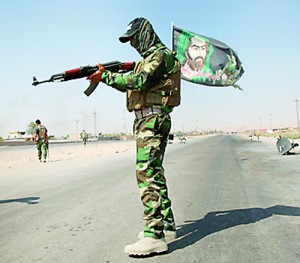Sunday Times 2
Obama calls on allies to defeat Islamic State
View(s):NEWPORT, United Kingdom, Sept 6 (AFP) -US President Barack Obama outlined plans for a broad international coalition to defeat Islamic State extremists in Iraq and Syria, but they received a cautious response from European allies.
Speaking at a NATO summit, Obama said the United States would also try to involve Middle Eastern allies in a strategy to counter the jihadists, who have overrun large swathes of territory.

A fighter from the Shi'ite Badr Brigade militia guards a checkpoint that was recently taken from militants of the Islamic State outside the town of Amerli (REUTERS)
The president said regional involvement was “absolutely critical”, although the State Department added that there were “no plans” for military coordination with Iran in the fight.
“We’re going to degrade and ultimately defeat ISIL,” Obama added, using the previous name of the Islamic State, which has claimed responsibility for videos showing the beheading of two US journalists.
Iraqi Kurdish forces and Shiite militias on Friday discovered mass graves containing 35 bodies after retaking the town of Sulaiman Bek from jihadists.
Along with Iraqi military troops, they broke a months-long jihadist siege of the town of Amerli last Sunday and retook Sulaiman Bek the following day in the first major successes for the federal government since the crisis began.
Obama said he was “confident” a coalition was being formed, with US officials saying the plan was to have a strategy in place by the start of the United Nations general assembly later this month.
He said there was “unanimity” among NATO members that the group “poses a significant threat”, although many cautioned that any action hinged on the formation of a new Iraqi government.
But European allies, while supportive of the US initiative, were more cautious.
Britain has left the door open to air strikes in Iraq, but Prime Minister David Cameron played down the prospect of any immediate action.
American officials were quick to distance the process from the heavily-criticised “coalition of the willing” that was formed ahead of the 2003 US invasion of Iraq.
“When we talk about what we are doing today, in no way do we want to resemble anything that was done in 2003,” State Department deputy spokeswoman Marie Harf told reporters.
“We’re certainly not using that playbook

